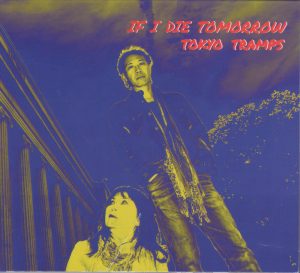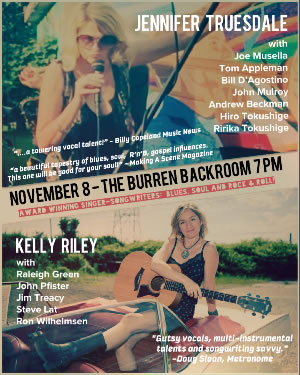 Tokyo Tramps have released their latest of several studio albums If I Die Tomorrow, and it features many of their original tunes that their vast fan base has heard they play live in the last few years. Recorded by Ducky Carlisle and produced by Carlisle and Peter Parcek at Carlisle’s Ice Station Zebra studio in Medford, Massachusetts, these track crackle with life in every earthy note. There is nothing like good sound to make the best original roots music sound its best.
Tokyo Tramps have released their latest of several studio albums If I Die Tomorrow, and it features many of their original tunes that their vast fan base has heard they play live in the last few years. Recorded by Ducky Carlisle and produced by Carlisle and Peter Parcek at Carlisle’s Ice Station Zebra studio in Medford, Massachusetts, these track crackle with life in every earthy note. There is nothing like good sound to make the best original roots music sound its best.
Opening cut “Flowing Water” gets a riffy treatment from Satoru Nakagawa and a layer of lovely coos from his wife Yukiko Fujii, bass guitarist, keyboard player, and co-lead vocalist of this blues trio. Nakagawa goes into some of his best guitar phrasing here, pressing out a line that is a wide as it is sublime, haunting. The flowing water metaphor used in this song is wholly original and it works to describe the consistency of emotion this tune is all about.
Title track “If I Die Tomorrow” feels like a mash up of Jimi Hendrix pensiveness and Muddy Water era deep feeling blues. Nakagawa’s lead guitar shines as it glides its electric timbre over Fujii’s shimmering organ line. Nakagawa sings his heart out, making the listener feel his anguished lyrics as much as his smoldering six string.
“Why” features the very likable Fujii lead vocal. She just makes her lilting vocal melody line come to life with a timbre and delivery unique to her. It’s a treat to hear her caress these lyrics over a twitchy guitar phrase and soulful organ part. Fujii and drummer Tim Carman forward things with a slapping groove that makes each motion hip and in the pocket.
“Woman” is a Tokyo Tramps take on the slow boil blues, the kind that begin gentle, tender, and reflective only to become a torrent of soulful out pouring. Nakagawa delivers the sensitivity well in his introductory lines. Beneath his lead vocal, he presses out an emotive part on his six string, one that takes the listener deep into the soul of this piece. The couple sing well together, their vocal and emotive chemistry easily rendered, and they build up this piece into a power blues ballad, intense emotion coming out of the guitar amp while the drumming gets loose and fast, furthering a sense of frenzy. It’s the art and the drama that make this piece work.
Tokyo Tramps rock out on “Bluebird,” playing at a brisk, up tempo pace that give this an edge. Harmony vocals coat, with great feeling, the jumpy electric guitar chords, bucking bass guitar, and a propulsion of drum fills. There is also a cool irony that contrasts the image of a “blue bird” with this whipcord pace and drive.
Adding an instrumental piece to this assemblage of exceptionally good material makes perfect logical sense. Showcasing the Tokyo Tramps‘ instrumental glory, “Misty Forest” recalls the forlorn lead guitar work of Jimmy Page from the first Led Zeppelin album. Hard driving psychedelic blues is made of stuff like Nakagawa’s tense phrasing and the multiple moving parts of bass and drums. Impressively, Nakagawa has come up with a slight twist in that he keeps something empowered rather than weepy in his line. He lets his electric guitar sing what is in his heart, making his axe the microphone of his wide, expansive soul, and the result is a classy, tasteful work of art.
Back into riffy material, Tokyo Tramps offer “Betty’s Kitchen,” a lyrical journey inspired by Nakagawa’s adventurous youth in Louisiana where he was supposed to be studying. Tossing in a Robert Johnson song title indicates Nakagawa’s interest and influence. Injecting riffage into his phrase, he keeps this song at once solid and jumpy, a wave of notes that keeps the toes tapping, the head bobbing, and the Tramps fans happy.
“Talking To Someone” finds Nakagawa singing smooth, like a come on song. His and Fujii’s vocal slide into play as precise as laser beams. Beneath their flirty lines lies a stream of itching guitar notes, bouncy bass, and festive drumming. You know there is something going on after the talking.
“Mystery Man” is another up tempo, riff fest. Satoru unleashes plenty of catchy little bunches of notes. Fujii struts her stuff vocally, belting out her twisty lyrics with torch singer passion and rocking energy. Her sustains are gorgeous and she proves herself as good as many other women singing this kind of music, even national artists.
Tokyo Tramps go for tongue in cheek appeal in “Reprobates, Tramps, and Saints.” With a scratchy guitar back drop, Nakagawa and Fujii have fun with this poke at a party gathering. That guitar is drenched in old time grind, a raw sound that was born in a much better time in music. “Lovin’ Man” softens the album with a sensitive rendering of a man’s revelation toward love and away from immaturity. Bonus track “Winter Always Turns To Spring” offers fine slide guitar and biting lead guitar. Second bonus track “Blues In My Blood” offer more Nakagawa slide work as well as his lilting vocal and his partner’s harmonies.
If I Die Tomorrow is one of Tokyo Tramps finest release yet. Nakagawa has drenched his vocals and guitar more deeply into blues, Louisiana, and other roots material. Fujii, too, makes a stronger impression here as a vocalist and adding more of her keyboards broadens and thickens the textures in these especially good songs. This blues trio just keeps on getting better and better. Bravo.

